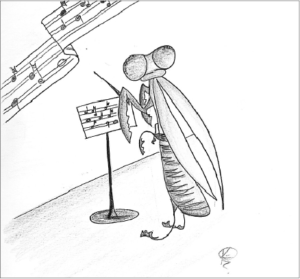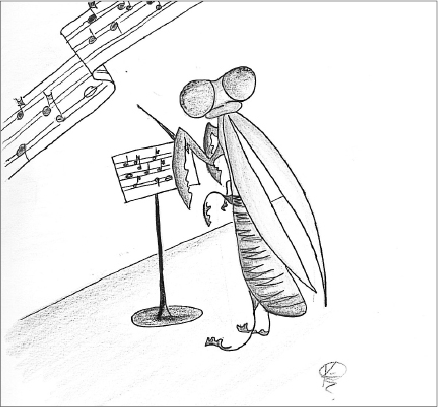Leslie Armstrong
Arts Editor
Here’s a stat you’ve probably heard before: if human civilization continues the way it is, we will need the resources of four planets to sustain ourselves. Here’s something you probably didn’t know: humans are virtually incapable of stopping this tragedy.
The reason for this is that humans don’t naturally feel empathy for the collective—they can only feel it for individuals. Insects, however, are wired the opposite way, only capable of feeling empathy for the community. Therein lies their key to survival.

As explained by York fine arts professors William Mackwood and Gwen Dobie, the masterminds behind interdisciplinary theatre company Out of the Box, if humans want to shift their fate of climate change disaster, they must be like insects. But at the end of the world, what would an insect say when looking back at humans and their demise?
In Mackwood and Dobie’s play-in-progress Bugzzz, a cautionary tale about the dangers of technological progress, a world is imagined wherein insects figure out how the humans went wrong.
They find themselves at the Palais Garnier, a famous Paris opera house, and come across the scores of Puccini’s Tosca. They figure out that the dots on the page represent sound, and they decide to collaborate on their own version of the opera libretto. Copenhagen-based composer Thomas Sandberg is currently working on the music for Bugzzz.
“The most exciting reason why we wanted to work with him is because he does a lot of work creating music on and for found objects,” says Mackwood. Sandberg will also be composing with an “interactive stage” in mind.
“You can create points on a three-dimensional stage where if an object like a hand passes through it, it will trigger an audio or a video event,” he further explains. “You can make a scale of music that if you do this,” his hand flies, “will go up and down the scale.”
In terms of costume design, much depends upon the lighting, Mackwood’s area of expertise. The actors will have light projected onto them to mimic the iridescent look of insects’ wings. Their best piece of equipment? The Kinect for the Xbox 360.
“It sees things in 3D, and sends out a little infrared grid,” says Mackwood. “The box has both a projector of infrared pattern and a camera that can read the infrared and tell that my nose is farther forward than the rest of my face.”
The overall aesthetic of the play is said to be that of a live comic book. “We have insects on stage talking, singing,” Mackwood laughs. “It was really important for me that people spend no time at all going ‘why is that insect able to do those things?’ You read a Superman comic, and as soon as you open the page, you look at that format, and you go ‘well, of course Superman can do that.’”
Dobie says that there will be the occasional subtitle and caption, fitting in with the comic book standard. “It means the actors can go ‘blah blah blah’ less.”
After interpreting Puccini’s Tosca, the bugs ultimately realize that humans as a whole, as destructive as they were, were a fascinating civilization in their emotional response to art, which would bring them together.
While the bugs were able to admire, they also assessed the faults of humans. Drawing heavily on Ronald Wright’s A Short History of Progress, Mackwood and Dobie were very intent on conveying, through evidence of technology’s effect on the world, that technological progress is bad.
William Mackwood offers a sobering thought.
“There’s one statistic that burns in my mind, that I cannot get out, and I checked it again today for the third time—1.2 million people are killed every year around the world in traffic accidents. Now, if that were a war, people would say, ‘what are we doing, we’re insane.’ But somehow, the automobile has enthralled us to the point where we forget that it is destroying our biosphere.”
But in the midst of all these bleak stats and the environmental caution that the two professors are armed with, they continually remind their audience that the last thing they want as educators is to sound preachy. To them, Bugzzz is not about telling people what the solution is, because there isn’t, in fact, a clear solution.
“I would want people to walk away with a head full of questions,” says Mackwood about the value of the play. “And a need to have conversation with people about what they’ve just seen, and what they can possibly do. Because the one thing that we believe in is ‘art into action’. Art has a responsibility.”


